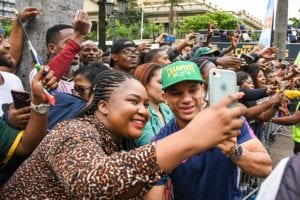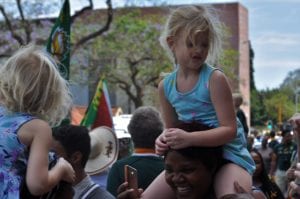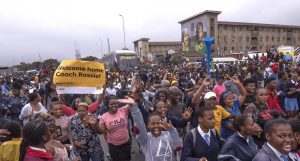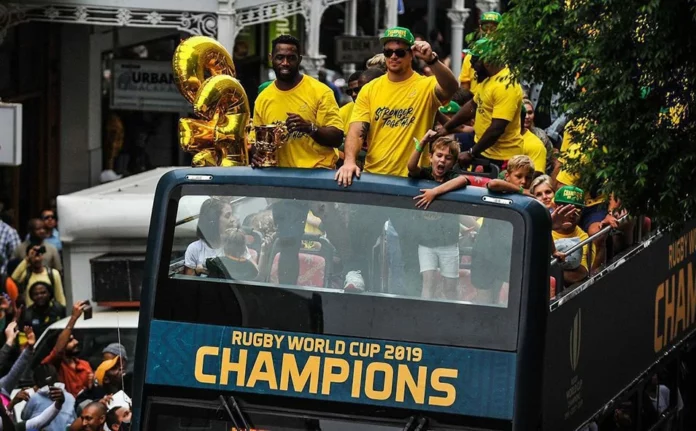Provinces that were left out of Rugby World Cup victory tour feel snubbed
The Springboks’ victory tour of some parts of the country has come and gone, but has also left a bitter taste in the mouths of many South African Springbok supporters.
The tour on an open top bus two weeks ago, was meant to parade to the nation the World Cup-winning Boks and showcase their prized possession, the Webb Ellis trophy, that will stay in the country for the next four years.
The tour itself started in Gauteng on Thursday, winding its way through four provinces before ending in the Western Cape on Monday. However, ordinary supporters from the other five provinces of Limpopo, North West, Mpumalanga, Free State and Northern Cape were left with a sense of not belonging
after their provinces were snubbed.
Except for the Free State, the four other provinces are often not perceived as major rugby provinces. But the victory parade was meant to touch South
Africans from all walks of life, no matter where they live. It was meant to unite. Indeed, President Cyril Ramaphosa and leaders across the political spectrum said as much.

Springbok supporters were looking forward to the Boks’ trophy tour and their first black captain, Siya Kolisi, lifting the trophy sky-high while celebrating the historic victory – with them. Or, to be factual, some of them.
During the parade itself, murmurs of discontent started bubbling over, with the Free State Rugby Union being the first to express their disappointment at
the decision not to include their province in the victory parade.
After completing the first leg in Gauteng on Thursday, November 6, the Boks were flown to Durban, where they toured on Friday, before moving to the
Eastern Cape’s cities of East London and Port Elizabeth on Saturday and Sunday, thereafter rounding up the tour in Cape Town on Monday.
The decision not to have the Boks parade in the Free State led to their rugby union issuing a statement condemning the SA Rugby Union for ignoring
a rugby-crazy province that has produced a number of past and present Springbok players.

The Free State has one of the most advanced rugby development programmes that starts at grassroots level at schools such as Grey College in Bloemfontein.
The high school has produced no less than 45 Springboks, including the Du Plessis brothers Morne, Jannie and Bismarck, Ruben Kruger, Francois Steyn and Ruan Pienaar.
Free State Rugby Union president Jerry Segwaba said: “Free State Rugby experienced unprecedented unhappiness and disappointment from all over the central region about the news that the Springbok trophy tour will not be visiting the central region of South Africa.
“Free State Rugby shares the frustration and unhappiness of supporters…Free State Rugby shares the feeling with central South Africa that the Springboks should have included the region in the tour because of the support that the Springboks enjoy in this part of the country.”
The Springbok triumph in Japan is of special significance because South Africa and New Zealand are the only countries to have won the Webb Ellis trophy
three times.
In his response to Sunday World’s inquiry about what informed the decision to exclude the other five provinces, SA Rugby Union commercial manager Andy Colquhoun said the main factor that determined the “length and the duration” of the trophy parade was “time constraints”.
“The constraints of time and geography meant it was physically impossible to visit all the centres we may have wished,” he said.

“The route was planned to hit our biggest urban areas and our most populous rugby- playing provinces. Under those constraints it meant that hard choices had to be made but they were informed by the desire to reach as many people as possible, which we believe we achieved.”
Bok supporters from Limpopo have also voiced their dissatisfaction at being sidelined from the celebrations, judging by the number of letters sent to Sunday World (See Letters on page 16).
Many South Africans are of the view the Springbok victory and the parade was meant to unite the people of this country but it seems the SA Rugby Union dropped the ball.
They misjudged and failed to foresee the significance of the Springboks’ victory and, most importantly, the tour as a unifying factor among South Africans.
The aggrieved have gone to as far as labelling the parade and trophy tour as divisive. They argue it is now a case of “us” and “them”, with the line drawn between the historically strong rugby-playing provinces and those with a lesser interest and following in the sport.
Another complaint was that as the Bok win was a catalyst to encourage young boys and girls at primary school level to take up the sport, the exclusion of their provinces dealt a huge blow to their ambitions.
This is a huge lesson for rugby offiials and administrators that its either you go the whole hog and do it as a national gesture or you don’t do it at all.
By Xolile Mtshazo




